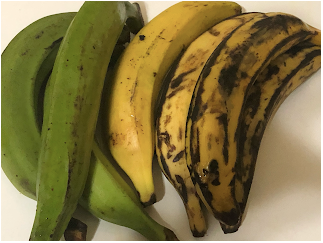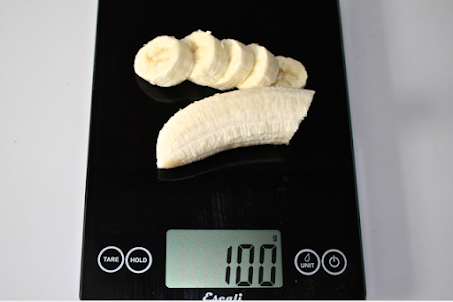What Are Plantains And Are Plantains Healthy?
Yes, plantains are extremely healthy packed with vitamins, minerals and they have several scientifically-backed health benefits. Because of their enormous health benefits, no one should ever be afraid of eating plantain due to concerns of weight gain.
Plantains (Musa Paradisiaca) are in the same family as bananas (Musa), but a different species. According to Wikipedia, there are over 70 varieties of bananas and plantains are one of those. There is no botanical distinction between bananas and plantains. Plantains are distinct from bananas in appearance and taste. Plantains are less sweet, typically bigger, and have thicker skin than the typical banana. Another difference is that plantains are typically eaten after cooking while bananas are primarily eaten raw. Plantains range in color from green(unripe), yellow(ripe), to black(very ripe). The taste and texture of raw plantains change as they ripen from bland, firm, and starchy to sweet, soft, and sticky. Plantains are indigenous to the tropics of Asia, Africa, and South America. Traditionally plantains as well as different species of bananas have long been used for medicinal purposes among indigenous people (1). Some of those medicinal uses include treating diarrhea, ulcerative colitis, diabetes, nephritis, gout, hypertension, and cardiac disease (1). A good amount of research has been done on the different banana species to substantiate these medicinal uses of banana and plantain. Keep reading to find out what science says about the potential health benefits of plantains and all about plantain including calories in plantain.
1. Anti-Diarrheal: (1) (2) (3) In present functional medicine, bananas are prescribed as a part of the "B.R.A.T" diet to manage diarrhea. "B.R.A.T" stands for banana, rice, applesauce, toast. Multiple research studies have found plantain and particularly green bananas effective in the treatment of diarrhea. Research on induced diarrhea in rats given plantain sap showed a significant decrease in the number of wet feces, and the total number of feces in the rats. The plantain sap was shown to be as effective as treatment with the anti-diarrhea drug loperamide (2).
2. May Lower Cholesterol And Prevent Atherosclerosis: (1) (4) High cholesterol levels can lead to atherosclerosis in the body. Atherosclerosis is the build-up of plaque deposits in arteries narrowing arteries which may lead to high blood pressure and increase one's risk of stroke or heart disease. Multiple research studies have found that eating plantain may be beneficial to decrease cholesterol and prevent atherosclerosis. In one study rats with high cholesterol were fed an unripe plantain diet of either "amala," and/or "boli" (boiled plantain flour and roasted plantain) for 21 days. The results of this study found the rats had significantly decreased LDL cholesterol(bad cholesterol), triglyceride levels, and increased levels of HDL(good cholesterol) following the study(4).
3. Lower Blood Pressure: (1)(5)(6)(8)(9)High blood pressure can lead to early death from stroke and/or heart disease. As noted above plantains may help prevent atherosclerosis and lower cholesterol. Decreased atherosclerosis may assist in lowering blood pressure. Bananas may help lower blood pressure by other mechanisms as well. One study found raw plantain flour from green unripe plantain to inhibit Angiotensin-converting enzyme (ACE) in vitro (5). ACE inhibitors are a class of medicines given to people with high blood pressure. The ability of the extracts from the plantain to act as an ACE inhibitor was hypothesized to come from the high antioxidant content of the plantain extracts. Another study saw a significant decrease in blood pressure in elderly women after two weeks who were given banana(musa paradisiaca) twice a day (6). This study attributed the results to the high potassium content in the fruit. They postulated that the high potassium may help to decrease sodium levels in the blood, act as a diuretic, and act as an ACE inhibitor. Increased potassium intake has been linked to lowered blood pressure (7). Other research studies on rats fed a plantain diet showed a decrease in blood pressure as well (8), and ACE inhibition (9).
4. Lower Blood Sugar For Diabetes Control and Treatment: (1)(5)(9)(10)(11) Unripe green plantain are considered a low glycemic food(10)(36). Consumption of food with a low glycemic index is recommended to help manage diabetes. Interestingly, the glycemic index of plantain changes depending on the cooking preparation. Roasted plantain appears to have the lowest glycemic index, while fried plantain has the highest(10). A research study on rats fed plantain-based formulated dough meals found that the rats had significantly reduced blood sugar levels comparable to the effects of metformin(11). Metformin is a medicine used to treat diabetes. Some attribute plantains' blood sugar-lowering effects to the resistance starch contained in it. Resistance starch supplementation has been shown to improve fasting glucose, fasting insulin, insulin resistance, and sensitivity(12). Some research attributes plantains' blood sugar lowering effect to polyphenols with antioxidant activity that inhibit amylase(5)(9). Amylase is an enzyme that breaks down starch and glycogen into simple sugars. So a decrease in amylase activity would lead to a lower blood sugar after eating.
5. Anti Ulcer: (1)(13)(14)(15)(16)(17)(18)(19) Numerous research articles have found plantain extracts to be both protective and even curative of peptic ulcers. The research suggests that plantain may promote wound healing by increasing mucosal cellular proliferation and prevent ulcers by strengthening the mucosa against ulcer-causing agents due to its high antioxidant activity. It is important to note that not all studies mentioned the ripeness of the plantain, but the studies that did mention ripeness used unripe plantain.
6. Anti-Bacterial/Antimicrobial: (1)(3)(19)(20)(21)(22)(23)(24) Multiple studies show that all parts of plantain may have antimicrobial effects including the leaf, peel, seeds(3), and fruit. Studies on plantain leaf extracts found them to have an antimicrobial effect inhibiting the growth of pathogens like MRSA(20), E. coli, and Pseudomonas (21). One study on plantain peels found an antimicrobial effect inhibiting the growth of fungi(candida albicans), E.coli, Staph, Bacillus, and Pseudomonas (22). Studies on plantain fruit found them to have an antimicrobial effect inhibiting the growth of pathogens like H.Pylori(19), Salmonella, Shigella, Pseudomonas, K.pneumoniae, E.coli, Staph, and Bacillus (23). Again many attribute the antimicrobial effects of plantain to the antioxidant activity in the plant.
7. Antioxidant(1)(3)(5)(9)(15)(19)(21)(26)(27)(28)(29)/Anti-Cancer:(24) As noted above many of the medicinal properties of plantain have been attributed to the high antioxidant activity of the plant. In a scientific review of over 100 research articles on the medicinal and chemical properties of plantain published on May 8, 2021, they concluded that several studies did in fact validate the usage of plantain in infectious diseases(24). The antioxidant and anti-inflammatory health benefits of plantain may come from the polyphenols and phytosterols found in them(24). According to Wikipedia foods with high amounts of phytosterols have also been found to help lower cholesterol. Antioxidants have been well researched and are linked to cancer prevention as they prevent cell damage in the body(25). Numerous other studies have found an abundance of antioxidants in plantain(26)(27)(28)(29).
Calories In Plantain And Nutrition Facts
Source for nutrition info (24) USDA updated daily Intake chart
The research(31)(32)(33)(34) is clear, the best way to preserve nutrients in plantain when cooking is roasting followed by steaming, boiling, and least protective being deep fat frying. Frequent consumption of fried food should be avoided as well, as it can lead to weight gain due to the excess calories from oil. When boiling plantain it appears that boiling with the peel on preserves more nutrients and/or nutrients from the peel leach into the fruit as well (35). In Nigeria, one popular way of cooking plantain is by simply roasting whole plantain on a grill plain either when ripe or unripe. This dish is called bole. Looking for other healthy plantain recipes? Check out my recipes for baked plantain, crispy baked plantain chips, and plantain and yam porridge.
Conclusion:
Is plantain fattening? The quick answer is NO! So there's no need to stop eating plantain and in fact, it is quite healthy. Scientific research has found that consumption of plantain, particularly unripe green plantain may help treat atherosclerosis, diabetes, high blood pressure, diabetes, and ulcers when combined with a well-balanced diet and active lifestyle. Plantain also has antibacterial and anti-inflammatory properties due to its high antioxidant contents. Plantains are low in fat and provide a good source of fiber, Vitamin A, C, magnesium, potassium, and moderate amounts of phosphorus. Due to the fiber content and resistance starch contained in unripe plantain, plantain digest slowly, and has a lower glycemic index appropriate for people with diabetes to consume(36). In one large plantain, there are roughly 300 calories. So the key is to eat them in moderation to avoid weight gain. Honestly, by doing all of this research, I have convinced myself I need to eat more unripe plantain, and perhaps you should too. Let me know in the comments what's your favorite plantain recipe.
This post is not medical advice. It is for informative purposes only.








6 Comments
00EB437A7B
ReplyDeletesms onay
Oyun İndirme Siteleri
Online Oyunlar
Instagram Takipçi Kasma
Coin Kazanma
4D042DD28E
ReplyDeletetakipçi satın al
En Güvenilir Hisse Senedi Nereden Alınır
Instagram Takipçi Atma
Avast Cleanup Aktivasyon Kodu
EFT ile Takipçi
8597B4EB91
ReplyDeletebot takipçi instagram
green swivel accent chair
2026C7601B
ReplyDeletekadın takipçi
nautica swivel accent chair
ReplyDeleteSosyal medya etkileşimini artırmak isteyenler için en iyi çözümlerden biri smm panel hizmetleridir. Bu panel sayesinde hesabınıza hızlı ve güvenilir şekilde takipçi beğeni ve yorum ekleyebilirsiniz. Ayrıca smm panel kullanımı oldukça pratiktir ve çeşitli paket seçenekleri sunar. Sosyal medya stratejinizi güçlendirmek için bu paneli değerlendirebilirsiniz.
ReplyDeleteGelişen teknoloji sayesinde artık istediğiniz oyunu kolayca bulup indirebilirsiniz. Eğer yeni oyunlar keşfetmek veya sevdiğiniz oyunları güncel tutmak istiyorsanız, oyun indir sitesi sizin için ideal bir kaynak olabilir. Bu platform sayesinde zaman kaybetmeden en güncel oyunlara ulaşabilir ve keyifle oynayabilirsiniz. Her zaman güvenilir ve hızlı indirme seçenekleri sunan bu site, oyun severlerin vazgeçilmezi haline gelmiştir.